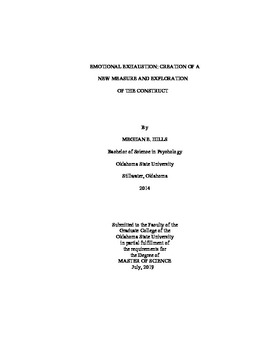| dc.contributor.advisor | Wells, Tony | |
| dc.contributor.author | Hills, Meghan E. | |
| dc.date.accessioned | 2020-01-30T19:46:39Z | |
| dc.date.available | 2020-01-30T19:46:39Z | |
| dc.date.issued | 2019-07 | |
| dc.identifier.uri | https://hdl.handle.net/11244/323399 | |
| dc.description.abstract | Depression is an important mental health issue that affects many people each year. Understanding depression and its associated constructs is crucial to the prevention and treatment of this disorder. Until now, emotional exhaustion has been exclusively studied in the context of burnout and job satisfaction. The current study aims to bridge this gap in the literature by creating a new measure of emotional exhaustion that more broadly assesses the construct and relating it to other relevant measures. Emotional exhaustion has been shown to be related to depression in the context of burnout. The creation of the new measure of emotional exhaustion, the Emotional Exhaustion Questionnaire (EEQ), is described. The EEQ was administered to 200 adults through Amazon's MTurk service. The measure had excellent internal consistency and consisted of a single factor. Results supported the convergent validity of the EEQ as it was strongly and positively related to the traditional measure of emotional exhaustion used in burnout literature, the Maslach Burnout Inventory (MBI). The EEQ was also related in expected directions to a number of factors that have previously been associated with emotional exhaustion in the burnout literature including neuroticism, depression symptoms, effort-reward imbalance, and emotional dissonance. When added into a linear regression model predicting depression symptoms, the EEQ significantly improved upon a model including only the MBI, which suggests that the EEQ provides some incremental utility over the MBI. Exploratory analyses indicated that the EEQ was related to other relevant measures in expected ways including measures of suicidal ideation, distress tolerance, and non-suicidal self-injury. Overall, the EEQ is a brief, highly internally consistent measure of emotional exhaustion with good evidence for convergent validity. This provides good initial evidence to support future studies investigating the potential causal relationships between emotional exhaustion and psychopathology. | |
| dc.format | application/pdf | |
| dc.language | en_US | |
| dc.rights | Copyright is held by the author who has granted the Oklahoma State University Library the non-exclusive right to share this material in its institutional repository. Contact Digital Library Services at lib-dls@okstate.edu or 405-744-9161 for the permission policy on the use, reproduction or distribution of this material. | |
| dc.title | Emotional Exhaustion: Creation of a New Measure and Exploration of the Construct | |
| dc.contributor.committeeMember | Mullins-Sweatt, Stephanie | |
| dc.contributor.committeeMember | Grant, DeMond | |
| osu.filename | Hills_okstate_0664M_16383.pdf | |
| osu.accesstype | Open Access | |
| dc.type.genre | Thesis | |
| dc.type.material | Text | |
| dc.subject.keywords | depression | |
| dc.subject.keywords | emotional exhaustion | |
| dc.subject.keywords | measures | |
| thesis.degree.discipline | Psychology | |
| thesis.degree.grantor | Oklahoma State University | |
